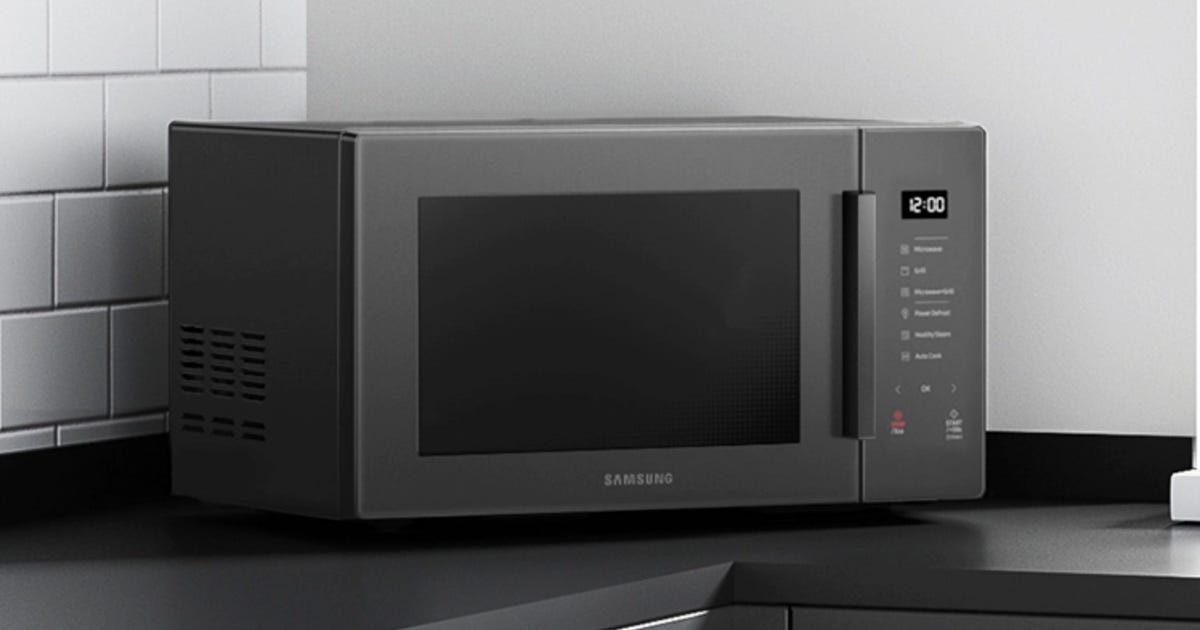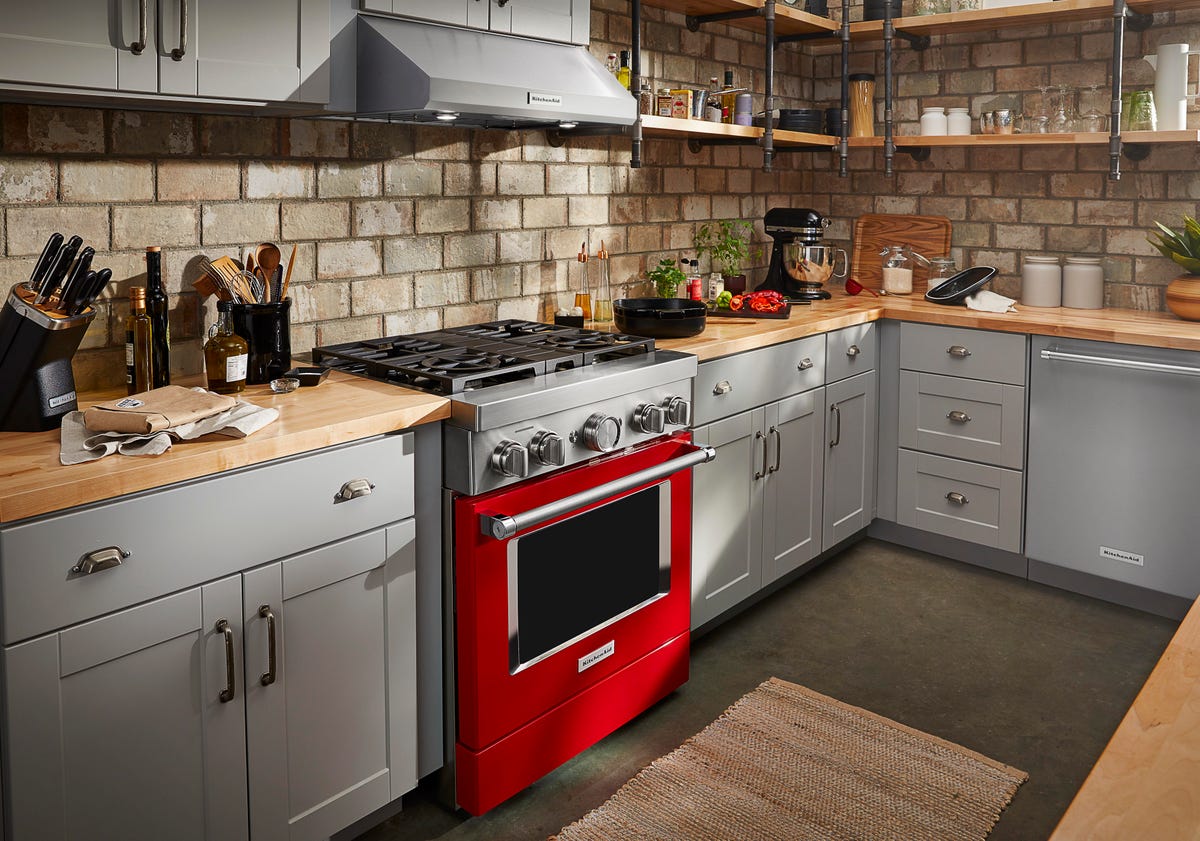Oven air fryer to run what energy does a microwave use how much electricity does a microwave consume how much power does a microwave use energy is food here s how to cook the best eggplant ever here synonym

Here's How Much Energy a Microwave Uses Compared to an Oven
This story is part of Home Tips, CNET's collection of practical advice for getting the most out of your home, inside and out.
To save the most money around the house, it takes a multipronged approach. Turning off the lights and keeping the thermostat set to an optimal temp will help trim your energy bill. You can also sub in more energy-efficient kitchen appliances in place of the big wattage suckers.
An air fryer, when used to cook in place of the big oven, will definitely save you energy and money. Likewise, the microwave, while not without its limitations, uses far less energy than a full-sized oven. If you can find ways to fire up the microwave instead of the big oven, you might start to see a drop in your overall energy costs.
For this exercise, I've calculated the energy it takes to run a microwave and how that pull compares to the rough energy pull (and cost) of a full-sized oven. While a microwave can only do a fraction of what an oven can, you still might be able to sub it in for certain cooking tasks and trim next month's electricity or gas bill.
Here's exactly how much energy the average microwave uses and how much you could save by using it instead of an oven or stove.
Microwave vs. large oven
| | Microwave | Gas oven | Electric oven |
|---|---|---|---|
| Average energy draw per hour | 1,200 watts | 7,000 BTUs | 3,000 watts |
| Cost per hour | $0.20 | $0.40 | $0.51 |
| Cost per year (365 hours cooking) | $74 | $146 | $182 |
Much like the air fryer, the microwave proves to be an extremely energy-efficient way to cook -- even more so when you consider how quickly it cooks. You can certainly save money on your energy bill if you find ways to use your microwave instead of the large oven.
Here's how I got these figures.

Microwaves can't do everything but they can save you some money on your energy bill.
Molly Price/CNETHow much energy does a microwave us?
Microwaves run solely on electricity and a standard microwave requires about 1,200 watts. Larger and more powerful microwaves may pull slightly more energy than this rate while smaller microwaves generally use a bit less. If you were to use your microwave for 15 minutes every day, that would break down to 300 watts per day or 0.3 kWh. In New York, where I live, a kWh is roughly 17 cents so your daily cost would be about 5 cents. Multiply that by 365 and you get a rough yearly total.
And what about the cost to run a microwave?
To run your microwave for 15 minutes every day uses roughly 109.5 kWh and in New York state would cost you about $18.60 a year. If you used it for an hour each day, it would cost about $74 for a year.
Read more: I'm Loving This $98 Microwave That's Also an Air Fryer

Large ovens may be versatile but they pull loads more energy than smaller ovens.
KitchenAidHow much energy does a gas oven use?
To calculate the operating cost of your gas oven, we take the energy rating of the oven in Btu and divide it by 100,000. Multiply the result by the cost per therm of natural gas in your state (varies by state), then multiply by the projected number of hours it is used.
How much does it cost to run your oven?
To calculate the operating cost of an 18,000-Btu oven, for instance, you'll divide 18,000 by 100,000, giving you 0.18. We'll also need to find the average price per therm of natural gas in your state. This chart has the most recent prices via the US Energy Information Administration. Note that this chart is listed in dollars per thousand cubic feet, so you'll need to divide by 10. For instance, if the chart price is $23, you'll use $2.30 to calculate the cost.
In New York, the price is currently $2.20 per therm (about average for the US). Next, we'll multiply that price for a therm by the number you calculated in the last step (0.18 in this example) to get the operating cost per hour of using your gas oven.
For a New Yorker, it'll cost about 40 cents per hour to run an 18,000-Btu oven. If I were to run an oven for an hour per day, it would cost $146 per year. In some states, including Georgia, Florida and Ohio, natural gas is about 30% higher than the national average. In Hawaii, it's more than double.

Modern ovens are more efficient than they used to be but they can't compare to air fryers or microwaves.
Sarah Tew/CNETHow much energy does an electric oven use?
To find the total cost to run an electric oven, you'll calculate the wattage pulled per hour of cooking. Most electric ovens draw around 3,000 watts, a rate that varies depending on the temperature. Once you find the wattage via the appliance tag or an online product listing, multiply that by the number of hours you use the oven each day (we'll use 1 hour for this calculation), then divide by 1,000 watts to find the kilowatt-hours, or kWh, of electricity used.
And what about the cost to run an electric oven?
Next, find the average price per kWh of electricity in your state. For that, you can consult this chart that has the 2020 prices listed in cents per kWh. Multiply that amount by the number you just calculated (3 kWh in this example) to determine your operating cost per day.
Working with New York's current electricity rate of 17 cents per kWh, a 3,000-watt oven would cost about 51 cents per hour when run at high heat. If I used my oven for roughly an hour per day for one year that would equal roughly $182 per year.
How much energy and money can you save using a microwave?
A microwave uses significantly less energy than either a gas or electric oven. To use your microwave for one hour every day would cost you about half the total energy of a natural gas oven and 60% less than an electric oven. Keep in mind that you very likely won't use your microwave for an hour every day, since it cooks so much faster than a standard oven.

Air fryers are still my pick for an energy-saving alternative to your large oven.
ChefmanI still recommend an air fryer to cut energy costs
While a microwave proves to be an energy-efficient appliance, it lags far behind other ovens in terms of results. Microwaves are fine for defrosting and reheating certain frozen meals, but if you overcook food in a microwave (not hard to do) you'll almost certainly end up with a rubbery, inedible lump.
Air fryers are another quick and energy-efficient countertop appliance that churns out markedly better results than microwaves. An Air fryer is a super convection oven that blasts food with quickly circulating air so it gets crispy on the outside without overcooking the inside. Air fryers also require almost no preheat time which means even more savings on your monthly electric spend. Here's my complete guide to air fryers to help you decide. The best part is you can get an excellent air fryer for under $75.
More ideas for saving on energy
Source
Blog Archive
-
▼
2022
(158)
-
▼
December
(42)
- OnePlus 10 Pro Peek Reveals Lots Of Oppo Software DNA
- Facebook Plans To Break Out Its VR, AR Business
- How Gardening Can Help With Climate Change Anxiety
- Google Updates In-App Billing Rules To Allow Rival...
- How Ukraine Raised Over $55M In Crypto To Help Res...
- Amazon Fire TV Cyber Monday Deals That Are Still A...
- Best Smart Home And Appliance Deals Of Prime Day 2022
- Ninja's Do-It-All Coffee Maker Is Down To $120 (Sa...
- Apple Is Redesigning The Home App
- Facebook's Updated Values Include 'Meta, Metamates...
- Fitbit's Cheapest Fitness Band Is Getting A Big Up...
- This Lens Turns A GoPro Into A 3D Camera (hands-on)
- India's Ratan Tata Takes Slice Of Phone Maker Xiaomi
- Good Trouble's Sherry Cola On Why Margaret Cho Is ...
- Essentials To Pack In Your Diaper Bag
- Bill Gates Talks 'Grieving' The Loss Of His Marria...
- 'Prey' Ending And Cool Post-Credits Predator Tease...
- Prop Maker Builds Tiny Iron Man Costume For His Si...
- 2023 Cadillac Lyriq Comes Out Swinging
- What States Can And Can't Do When Banning Abortion
- 'Westworld' Season 4, Episode 6 Recap: 'Fidelity'
- Intel Buys The Industry's First Next-gen Chipmakin...
- Galaxy S21 Ultra 5G Review: Samsung's Premier Phon...
- OpenSea Says At Least $1.7M In NFTs Stolen In Phis...
- Insta360 One RS Modular Action Cam Gets A Big 4K P...
- Tesla Insurance Spreads To Colorado, Oregon And Vi...
- 2023 BMW IX XDrive50 Review: Pleasing Performer, V...
- Netflix Loses 200,000 Subscribers, Counts Password...
- GoPro Hero3+ Silver Edition Review: GoPro Design, ...
- Best Debit Cards For Kids And Teens In September 2...
- Musk Sells About $8.5 Billion In Tesla Stock After...
- 2022 Kia Stinger 2.5T Review: A More Compelling Ba...
- Renter-Friendly DIY Projects You Can Do Right Now
- 12 Of The Best Hidden WhatsApp Features You Need T...
- Here's How Much Energy A Microwave Uses Compared T...
- Polio Found In New York City Wastewater: Health Of...
- 'The Internet's Best Friend': TikTok Comedian Gets...
- How To Enable Snapchat Log-in Verification
- Twitter Shareholder Sues Elon Musk Over Share Acqu...
- Compare FHA Mortgage Rates
- Thunderstorms Delay, Cancel Thousands Of US Flight...
- Steam’s Halloween Sale: Deals On Tomb Raider, Da...
-
▼
December
(42)
Total Pageviews
Search This Blog
Popular Posts
-
Dji om 5 gimbal stabilizer dji om 5 smartphone gimbal stabilizer review dji om 5 handheld gimbal dji om 5 gimbal review dji om 4 handheld fo...
-
Apple watch 7 review a slight upgrade compared with crossword apple watch 7 review a slight upgrade compared in spanish apple watch 7 review...
-
Google pixel 6 and pixel 6 pro models drop toe difference between google pixel 6 and pixel 6 pro difference between google pixel 6 and 6a go...
